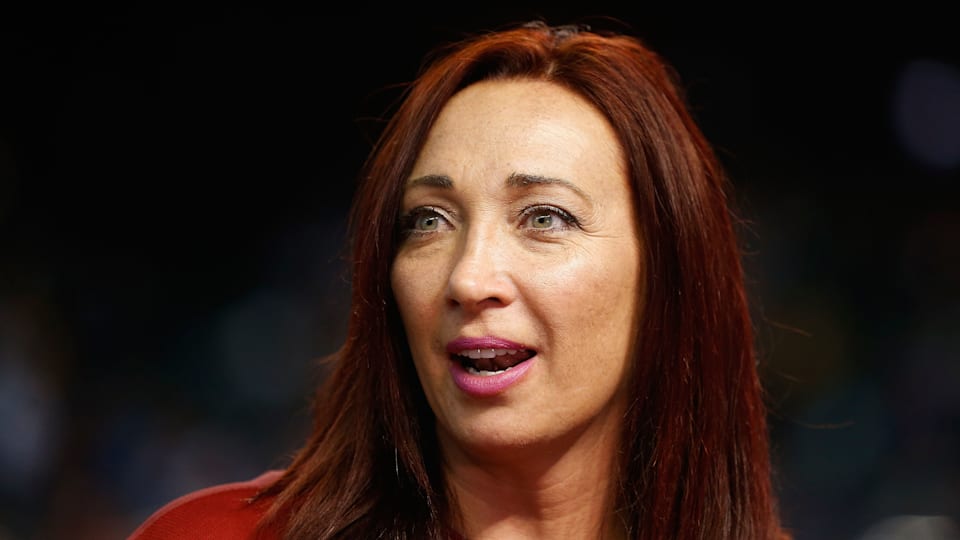
Six-time Olympic champion swimmer Amy Van Dyken knows what it feels like to go golden at the Games.
But that’s not all that the Olympics are about, the NBC analyst told Olympics.com between commentary shifts during Tokyo 2020.
“When I think of the Olympics, I rarely think of medals,” Van Dyken said. “Just to be here is a huge deal. I want people to understand that.”
Van Dyken has been there herself – twice. Having just missed out on qualifying for Barcelona 1992, she landed an outstanding four gold medals at Atlanta 1996, becoming the most successful athlete at those home Games and the first American woman to win four events in the pool at one Olympics.
She’d add two more relay golds at Sydney 2000. But it’s the friendships, hard work, camaraderie and resilience, she says, that means the most. Van Dyken overcame severe asthma in her career to win gold.
“The Olympics is about finding something that you love, working as hard as you can at it to be the best that you can. And then going into this big, huge global competition and doing things that you never thought you could do." - Amy Van Dyken
Calling races from a commentary booth in Stamford, Connecticut, Van Dyken drew two themes from a Games unlike we’ve ever seen before: “[It’s been about] resilience and never, ever letting anyone tell you what you can and can't do,” she said.
Van Dyken on spectacular Bobby Finke
Team USA garnered 30 medals in the pool, including 11 golds. For Van Dyken, several stories splashed out of the water for different reasons, including those of Americans Allison Schmitt, Katie Ledecky, Katie Grimes, Bobby Finke, Simone Manuel, Erica Sullivan and Caeleb Dressel - among others.
Dressel’s emotional moment with his family – connected via video call while he was live with NBC on the pool deck – showcased a changed Games to Van Dyken, while also highlighting what work athletes put in away from the cameras’ glare.
“The fact that Caeleb Dressel couldn't even speak when he was talking to his family, that was just so touching for me,” Van Dyken said, adding: “And I think that just sums up what the Olympics is all about.”
“In a ‘normal’ Olympics, you don’t really see your parents. You do the media and then you do the awards and drug testing and on and on and on. In Tokyo, they're actually getting a chance to see their family right after the races right there [on TV or video call]. I think it's spectacular.”
Van Dyken’s where-were-you-when moment came when Finke roared back in the men’s 800m freestyle final, swimming a lightning fast 26.39 final 50 metres, propelling him to gold.
“I mean, this is something that people are going to talk about, right? Like, ‘Where were you when X happened?’ We will always remember where were you when Bobby Finke went 26.3 on the back end of that 800. We'll remember that.”
While Van Dyken was enthused by teenagers Grimes, 15, and Jacoby, 17, she also felt for swimmers like Schmitt, in her fourth and presumably final Games at the age of 31, who were competing without fans in the stands.
“[Allison] knows what it's like to have that crowd there,” Van Dyken said. “She knows how they can pull you along in a race. So I feel for the athletes whose last Games this was because their last Games is going to be remembered as just no crowd. It was silent.”
Making her-story: Sullivan, Manuel, Hinds and more
What made plenty of noise, however, was the cracking of several glass ceilings, as Van Dyken put it, as more minority swimmers made waves in the pool, something she hopes will reverberate with youngsters at home.
“I think the representation that we have... kids can see themselves in these athletes,” she said. “You’ve got Erica Sullivan, a distance swimmer, who is part of the LGBTQ community. And then you've got Simone Manuel, who [with Natalie Hinds] made the very first relay team with two African American women on the same relay. Huge.”
While Van Dyken still values her accomplishments in the pool, she’s just as thankful for what she learned out of it at the Olympics, too.
“I learned how to be a good teammate. Swimming is such an individual sport, [but] you become a good teammate through these experiences. [The Olympics] also taught me just to live in that moment because they are moments you can never get back.” - Amy Van Dyken on the Olympic experience
